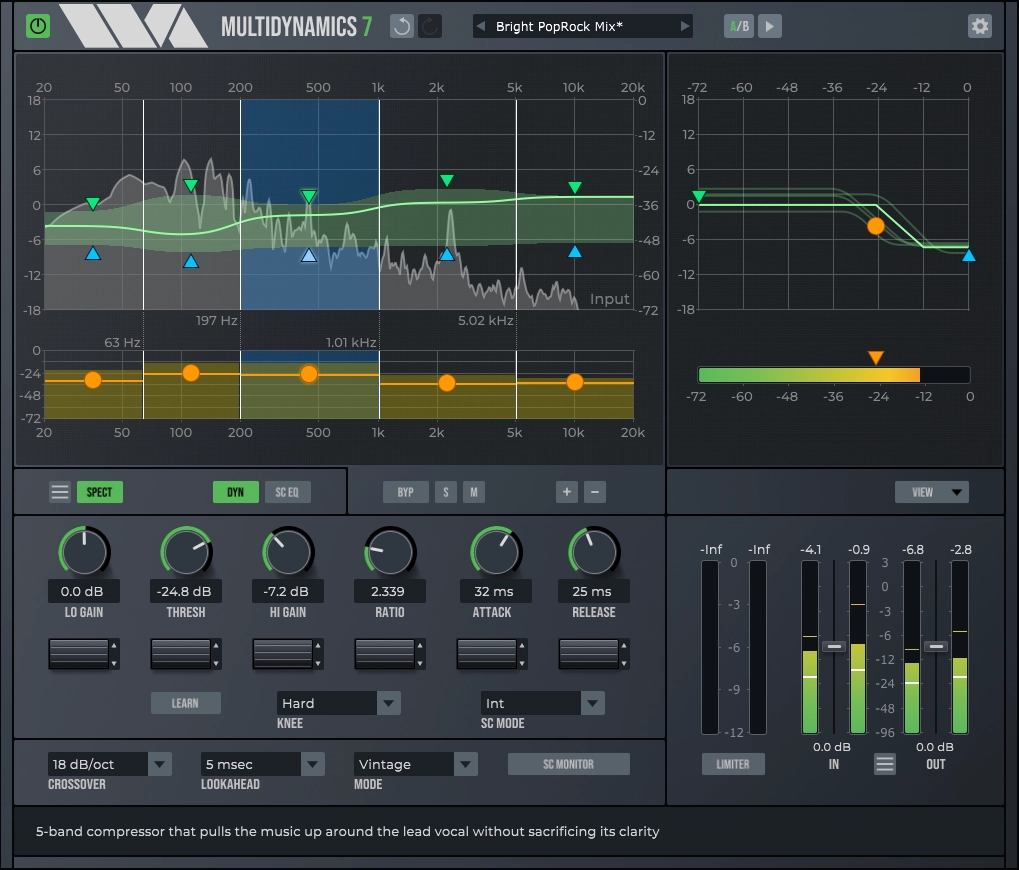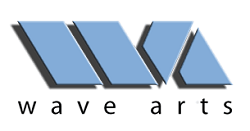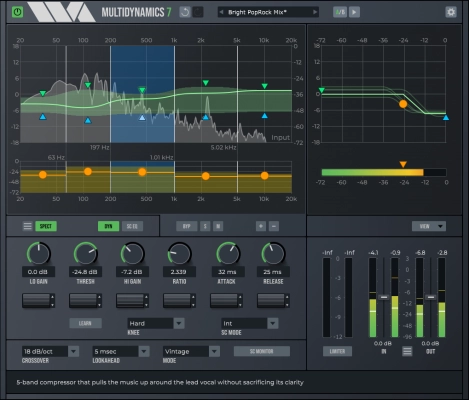Opens in a new window
Wave Arts MultiDynamics 7 - Download

Product Videos :
YouTube Video


Buy Online
In Stock
This product is delivered by download. Once your payment has been approved your software license will be sent to you via email. The download link for your purchase will be included with your license.
Software Is Not Returnable
MultiDynamics 7 is a powerful multi-band dynamics processor useful for mastering, track processing, sound design, and noise reduction. MultiDynamics provides up to 6 bands with independent compression or expansion/gating per band.
Multiband dynamics processing combines the techniques of equalization and dynamics processing, but is more powerful than a static equalizer or a single band dynamics processor. Below are some of the possible ways to use MultiDynamics 7.
Frequency-dependent dynamics
A simple application of multiband dynamics is to apply compression or expansion to a specific frequency range. For example, you may want to compress the vocals in a mix without affecting the low frequencies (bass, kick drum) or high frequencies (snare, cymbals). This is easily done by creating a midrange band to cover the vocal range and setting it to compress.
Level-dependent EQ
You can also think of multiband dynamics as providing EQ which is dependent on the level of the input sound. For example, you might want to brighten the sound of a high hat, but only when the drums are played softly. This can be accomplished by setting up a high frequency band that increases gain when the input is below threshold. This is more powerful than using a shelving EQ which will change the tonal balance at all levels equally.
Noise reduction
Another powerful use of MultiDynamics 7 is noise reduction. This is accomplished using multiple gating bands where the thresholds are set just above the ambient noise level. MultiDynamics 7 excels at de-noising and doesn't suffer from artifacts typical of FFT-based de-noisers.
Ducking
You can use MultiDynamics 7 to duck music behind narration so the foreground dialog stays intelligible when mixed with the background music. Using a multiband processor allows the music to be ducked only in the frequency ranges where there is dialog energy, which makes for a more transparent effect.
• Now supports extensive sidechain capability. Each dynamics band can be driven from the input signal or an external sidechain input. You can also specify wide-band or band-filtered signal, or select either the input or external signal filtered by a separate sidechain EQ. Hence you can drive one frequency band based on the signal from another frequency band
• New Learn feature automatically sets band thresholds to detected peak or RMS levels
• A peak limiter has been added to the output processing
• Input meters and an input gain control have been added
• User selectable display ranges for dynamics gain and input levels
• New metering section with options for peak, peak & RMS, RMS, and K-system meters
• Realtime spectrum display with many options
• Proprietary crossover filter network eliminates amplitude distortion between bands
• 6 dB/oct, 18 dB/oct, and 30 dB/oct crossover slopes
• Full featured compressor or expander/gate per band
• Clean and vintage compression modes
• Supports external sidechain input and sidechain EQ filter
• Adjustable knees and lookahead
• Zero latency operation when lookahead is off
• Latency compensation
• Per band bypass, solo and mute controls
• Comprehensive visualization of input levels and dynamic EQ response
• Learn function to automatically set band thresholds
• Realtime spectrum display
• Output peak limiter
• Level meters support Peak, Peak & RMS, RMS, and K-system
- OS-X 10.13 to MacOS 13 (Ventura)
- Apple Silicon natively supported (AU, VST3, AAX)
- AAX - Pro Tools 11 and higher
- 64-bit hosts only
WINDOWS - VST2, VST3, AAX
- Windows 7/8/10/11
- AAX - Pro Tools 11 and higher
- 64-bit hosts only
Multiband dynamics processing combines the techniques of equalization and dynamics processing, but is more powerful than a static equalizer or a single band dynamics processor. Below are some of the possible ways to use MultiDynamics 7.
Frequency-dependent dynamics
A simple application of multiband dynamics is to apply compression or expansion to a specific frequency range. For example, you may want to compress the vocals in a mix without affecting the low frequencies (bass, kick drum) or high frequencies (snare, cymbals). This is easily done by creating a midrange band to cover the vocal range and setting it to compress.
Level-dependent EQ
You can also think of multiband dynamics as providing EQ which is dependent on the level of the input sound. For example, you might want to brighten the sound of a high hat, but only when the drums are played softly. This can be accomplished by setting up a high frequency band that increases gain when the input is below threshold. This is more powerful than using a shelving EQ which will change the tonal balance at all levels equally.
Noise reduction
Another powerful use of MultiDynamics 7 is noise reduction. This is accomplished using multiple gating bands where the thresholds are set just above the ambient noise level. MultiDynamics 7 excels at de-noising and doesn't suffer from artifacts typical of FFT-based de-noisers.
Ducking
You can use MultiDynamics 7 to duck music behind narration so the foreground dialog stays intelligible when mixed with the background music. Using a multiband processor allows the music to be ducked only in the frequency ranges where there is dialog energy, which makes for a more transparent effect.
New Features in MultiDynamics 7
• All new interface with dark theme• Now supports extensive sidechain capability. Each dynamics band can be driven from the input signal or an external sidechain input. You can also specify wide-band or band-filtered signal, or select either the input or external signal filtered by a separate sidechain EQ. Hence you can drive one frequency band based on the signal from another frequency band
• New Learn feature automatically sets band thresholds to detected peak or RMS levels
• A peak limiter has been added to the output processing
• Input meters and an input gain control have been added
• User selectable display ranges for dynamics gain and input levels
• New metering section with options for peak, peak & RMS, RMS, and K-system meters
• Realtime spectrum display with many options
Highlights
• Up to 6 independent bands• Proprietary crossover filter network eliminates amplitude distortion between bands
• 6 dB/oct, 18 dB/oct, and 30 dB/oct crossover slopes
• Full featured compressor or expander/gate per band
• Clean and vintage compression modes
• Supports external sidechain input and sidechain EQ filter
• Adjustable knees and lookahead
• Zero latency operation when lookahead is off
• Latency compensation
• Per band bypass, solo and mute controls
• Comprehensive visualization of input levels and dynamic EQ response
• Learn function to automatically set band thresholds
• Realtime spectrum display
• Output peak limiter
• Level meters support Peak, Peak & RMS, RMS, and K-system
System Requirements
MACINTOSH - AU, VST3, AAX- OS-X 10.13 to MacOS 13 (Ventura)
- Apple Silicon natively supported (AU, VST3, AAX)
- AAX - Pro Tools 11 and higher
- 64-bit hosts only
WINDOWS - VST2, VST3, AAX
- Windows 7/8/10/11
- AAX - Pro Tools 11 and higher
- 64-bit hosts only
Media
Youtube video product demo
Q & A
There are currently no questions for this product.
Reviews
There are currently no reviews for this product. Be the first to write one!





